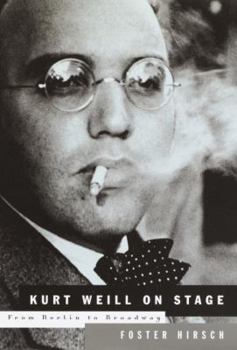Kurt Weill - On Stage: From Berlin to Broadway
Select Format
Select Condition 
Book Overview
His best-known song is "Mack the Knife " with words by Bertolt Brecht, from The Threepenny Opera, first performed in Weimar Berlin in 1928. Five years later, Kurt Weill fled the Nazis to come to... This description may be from another edition of this product.
Format:Hardcover
Language:English
ISBN:0375403752
ISBN13:9780375403750
Release Date:March 2002
Publisher:Alfred A. Knopf
Length:403 Pages
Weight:1.80 lbs.
Dimensions:1.4" x 6.6" x 9.5"
Customer Reviews
3 ratings
Excellent Overview of Weill's Work for the Theatre
Published by Thriftbooks.com User , 17 years ago
Kurt Weill's career has been hotly debated for more than 60 years. The questions began while he was still alive: Did he sell out his German artistry for the crass commercialism of Broadway? Or did he only really come into his own when he was freed from European snobbery? The answer is that both opinions are somewhat true and somewhat false. Rather than treat Weill's work as two separate careers, a European one and an American one as most commentators seem to do, Foster Hirsch treats Weill's career as a single entity. Hirsch's KURT WEILL ON STAGE is a superb chronological overview of Kurt Weill's work for the theatre, showing the logical evolution of his work. Weill became a world famous celebrity by age 30 as a result of his sensational THREEPENNY OPERA and MAHAGONNY. With the rise of Hitler and the Nazis, Weill wisely fled Germany, ending up in America after a period in Paris. But could he succeed in a new country and a new culture? Many distinguished European artist-refugees of that period simply could not adapt and faded into obscurity. Weill determined that he could succeed by writing in an American idiom. He made the transition quite smoothly, creating a string of popular Broadway shows that spawned hit songs like "September Song" and "Speak Low" before dying of a heart attack at age 50. At the time of his death he seems to have been just another Broadway composer, but with the passage of time, Weill's reputation has grown and he is now recognized as one of the 20th Century's great composers. In Hirsch's book, Weill's American shows are revealed to be a continuation of the innovative thrust of THREEPENNY OPERA. Just as he had worked with the prodigy Berthold Brecht in Germany, in America he collaborated with the nation's most prestigious writers, including the Pulitzer Prize winners Paul Green, Maxwell Anderson, Ira Gershwin, Moss Hart and Elmer Rice. Among his other collaborators were Ogden Nash and a pre-MY FAIR LADY Alan Jay Lerner. He worked with such noted directors as Max Reinhardt, Elia Kazan and Josh Logan and choreographers George Balanchine and Agnes DeMille. Mary Martin had her first starring role on Broadway in ONE TOUCH OF VENUS. Gertrude Lawrence made a huge hit in LADY IN THE DARK, which also catapulted Danny Kaye and Victor Mature to fame. And of course, there was Lotte Lenya, the German star whose unorthodox marriage to Weill is still confounding to most people. She had affairs with members of both sexes before, during and after the marriage to Weill; He made no secret of his affairs with other women. But they had an unbreakable bond that went beyond sex. Lenya devoted her life to promoting his work after he died and achieved her greatest fame late in life. Hirsch keeps his opinions of the work fairly restricted, which I appreciated. The only Weill score he really seems to denigrate is LOST IN THE STARS. (I have to agree with him, though.) This is not really a biography of Weill. The biographical
Inspiration for those who write for the musical stage
Published by Thriftbooks.com User , 18 years ago
Kurt Weill On Stage, a scholarly study published in 2002 by Foster Hirsch, is an outstanding overview of the theatrical career of one of the most talented and ambitious composers writing for the stage in the 20th century. Hirsch has access to the excellent materials of the Weill-Lenya Research Center and the support of the Kurt Weill Foundation for Music; he supplements the vast array of correspondence and interviews available to him with interviews and accounts of the creation of the works from participants and spectators. He writes compellingly about Weill's gifts as musical dramatist and collaborator. The book is utterly inspiring to anyone (like me) who has ambitions to write for the musical stage.
A Biography that focuses on Weill's enitre career
Published by Thriftbooks.com User , 21 years ago
Too often, scholarly work on Kurt Weill focuses mainly on his German career in the 1920s-- "The Threepenny Opera," "Mahagonny"-- but Weill had a career that extended well into the 1940s as a Broadway composer, and Hirsch's book explores both aspects, although it is clear he's a fan of Weill's later American work.I would recommend this book as a suppliment to Ronald Sanders' biography "The Days Grow Short," the standard of Weill biographies. However, Hirsch has access to different primary sources that Sanders did not have in the 1970s, and therefore can provide a different perspective. There is also a great deal of text devoted to Lotte Lenya, Weill's wife.It has been criticzed that Hirsch's book deemphasizes musical analysis, which is true, but that is not the purpose. Analyse the music yourself or find the writings of Kim Kowalke for musical analysis.I found this book enjoyable and a good supplient to many other Weill biographies on the shelves






